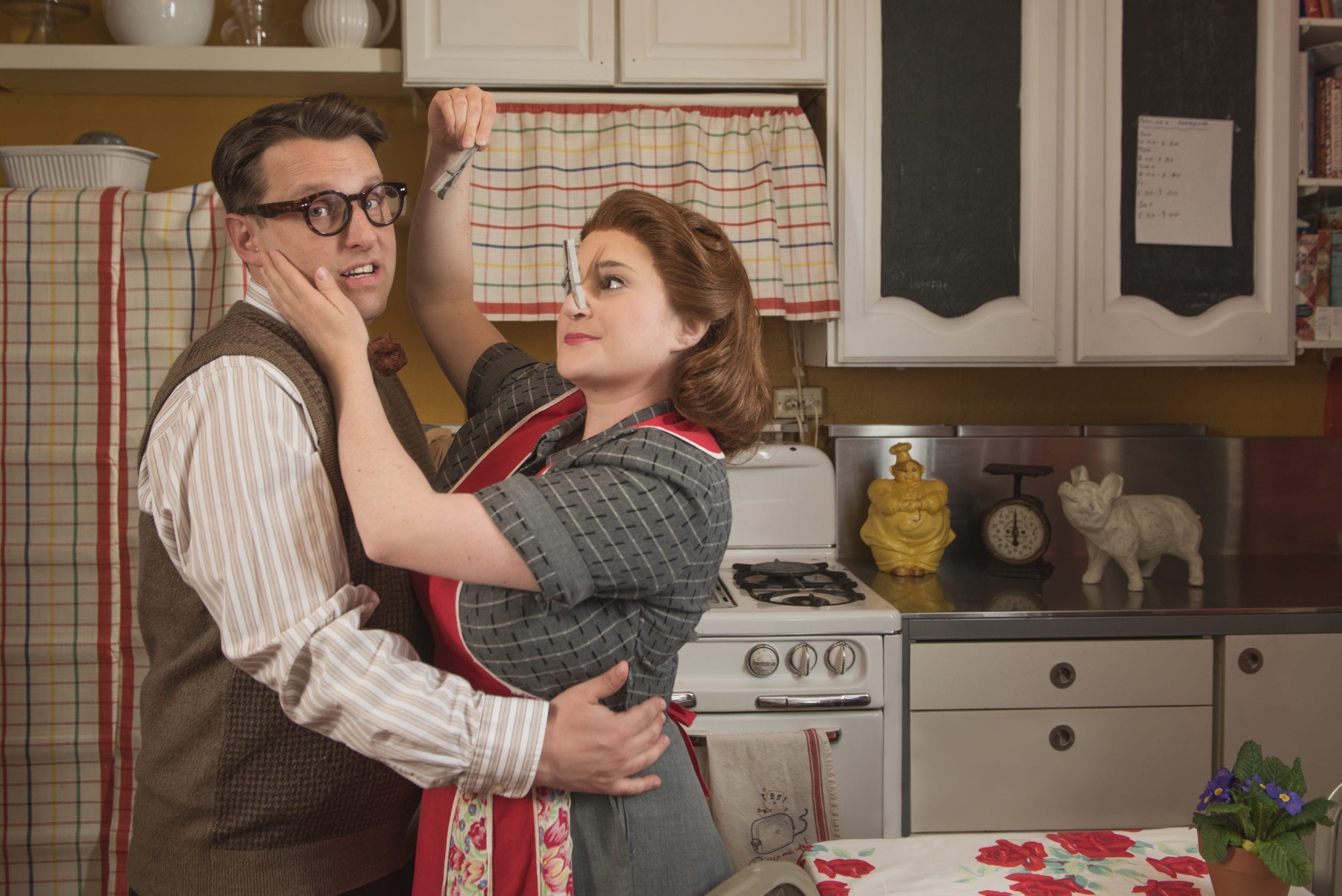OREM — Betty Blue Eyes is one of those shows that you have to see to believe, and several times my jaw was hanging open. Before seeing Hale Center Theater’s production, I had never seen three men sing an anthem about pork roast, nor had I ever seen a woman riding a tricycle dressed in pink playing a pig. And I had also never seen a professional musical that was so poorly conceived and structured.

Betty Blue Eyes’s script (written by Ron Cowen and Daniel Lipman) is what Roger Ebert called an “idiot plot,” a story that only moves forward because every character acts like an idiot. In the midst of post-war London, government meat rationing has created an underground black market for high quality meat. Three corrupt government officials have an unlicensed pig that they intend to slaughter for a fancy dinner. However local foot doctor Gilbert Chilvers steals the pig in an effort to exact revenge and also have some better dinners. But Gilbert doesn’t slaughter the pig immediately or fence it. And the pigs’ owners don’t bother tracking down the only other two individuals who know about the pig (one of whom is Gilbert). Furthering the idiot plot motif, every character who says they have seen a pig is flatly disbelieved. It was enough to make me yearn for the smart realism of Crazy for You.

But many musicals have paper thin plots, and a strong score can make the audience forgive a lot of flaws. Unfortunately, the mediocre George Stiles score contains few gems, with “Nobody” and “Lionheart” being the only memorable songs. But the worst aspect of the show is Anthony Drewe’s lyrics, which made me cringe in nearly every song. Some were juvenile (“Pig! No Pig! Pig! No Pig! You think I’ve gone loopy loo. / Pig! No Pig! Pig! No Pig! I know what you’re trying to do”), while others were clunky (“Class distinction has no hope. / Social climbers are thrown a rope”). A few were even downright shocking, with “He must be mad. / I thought Hitler was bad,” being the worst.
Probably most frustrating was that the play could not decide whether it wanted to be a campy, unserious romp or a musical with a social message about classism, corruption, and handling the despair of real life. Director Christopher Clark tried to push the show into the former category, and the silliest moments of the production worked best, including “Pig! No Pig!” and the formal dinner in the second act. But most of the material just was not silly enough to get there. For example, the government meat inspector, Mr. Wormold (played by Bryan Dayley), sang serious lyrics about “Upholding the Law,” but his prancing around the stage painting a side of pork undercut the song.
Like Clark, the actors were hobbled by the poor material that makes up Betty Blue Eyes. Only Ali Bennett had anything that approached a believable character in Joyce Chilvers, Gilbert’s forceful wife. Bennett made Joyce’s economic and social frustrations realistic, and her rendition of “Nobody” was sweet and endearing in the way it showed the character’s disappointment with her life. In the role of Gilbert, J. Patrick Livingston sang the score well and played his role earnestly, especially in “Place on the Parade” and “The Kind of Man I Am.” However, Gilbert’s motivations for challenging corrupt officials are not as strong as Joyce’s, and he is a much less decisive character. Consequentially, the character is too weak to be a good protagonist, and I never found a good reason to care about Gilbert or his wants.
The rest of the cast tried their best, (Oh, how they tried!) but end up as hapless victims of the show. I greatly pitied Jayne Luke, who played Joyce’s mother, a caricature who greedily steals food and is the brunt of stereotypical jokes about mother-in-laws and old people. Supposedly Joyce’s mother, “. . . used to be such a grand woman,” but Luke never got a chance to demonstrate it. Daniel Hess, Dustin Bolt, and Nate Brogan played the corrupt government officials competently, but their characters were so indistinguishable that the actors could trade lines and it wouldn’t matter much. Costume designer MaryAnn Hill’s decision to dress all three men in grey overcoats did not help in this regard.
Like a can of Spam in the midst of a meat ration, Betty Blue Eyes tries to substitute for an adequate stage musical. Assembled out of play-like remnants and pressed together into the form of a musical, Betty Blue Eyes won’t fool anyone paying attention.
[box]Betty Blue Eyes plays nightly (except Sundays) at 7:30 PM and Saturdays at 3 PM through May 27, with extra performances on Saturdays at 11 AM (beginning April 29) and 4 PM on Mondays and Fridays (beginning May 19) at Hale Center Theater (225 West 400 North, Orem). Tickets are $14-24. For more information, visit www.haletheater.org.[/box]
